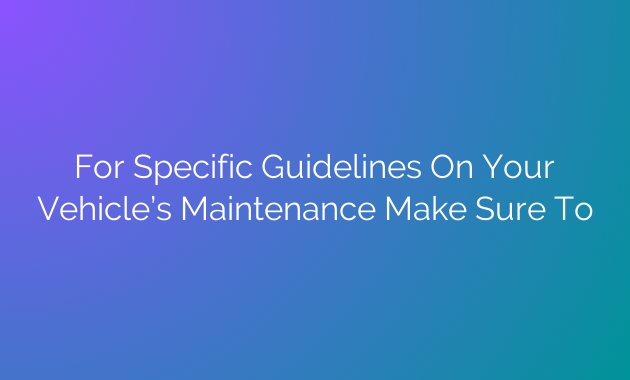Contents
- 1 For Specific Guidelines On Your Vehicle’s Maintenance Make Sure To
- 1.1 Importance of Regular Vehicle Maintenance
- 1.2 1. Regularly Check Your Vehicle’s Fluids
- 1.3 2. Keep Your Tires in Excellent Condition
- 1.4 3. Follow the Manufacturer’s Maintenance Schedule
- 1.5 4. Check and Replace the Air Filters
- 1.6 5. Inspect and Replace Worn-out Belts and Hoses
- 1.7 6. Keep Your Battery in Top Condition
- 1.8 7. Maintain a Clean and Polished Exterior
- 1.9 8. Ensure Proper Alignment and Suspension
- 1.10 9. Listen to Your Vehicle
- 1.11 10. Find a Reliable Mechanic
- 1.12 Conclusion
- 1.13 Frequently Asked Questions (FAQs)
For Specific Guidelines On Your Vehicle’s Maintenance Make Sure To
Regular maintenance is crucial to ensure that your vehicle remains in optimal condition. By following specific guidelines, you can extend the lifespan of your Car and avoid costly repairs. In this article, we will provide you with detailed information on how to maintain your vehicle effectively.
Importance of Regular Vehicle Maintenance
Proper maintenance not only improves the overall performance of your vehicle but also enhances your safety on the road. Regular upkeep can identify potential issues before they become major problems, saving you time and money in the long run. It also helps maintain the resale value of your car. By adhering to specific guidelines, you can keep your vehicle running smoothly for years to come.
1. Regularly Check Your Vehicle’s Fluids
Fluids play a vital role in your vehicle’s performance. Be sure to check your engine oil, transmission fluid, coolant, brake fluid, and power steering fluid regularly. Low or dirty fluids can lead to engine damage or brake failure, so it’s important to maintain appropriate levels and replace them as needed.
2. Keep Your Tires in Excellent Condition
Your tires are the only point of contact between your vehicle and the road. Regularly inspect them for wear and tear, and ensure they are properly inflated. Underinflated or bald tires can compromise your vehicle’s handling and fuel efficiency. Rotate and balance your tires as recommended in your owner’s manual.
3. Follow the Manufacturer’s Maintenance Schedule
Each vehicle has a specific maintenance schedule outlined in its owner’s manual. This schedule provides recommendations for oil changes, filter replacements, belt inspections, and more. Adhering to this schedule will help prevent unexpected breakdowns and keep your vehicle running optimally.
4. Check and Replace the Air Filters
Air filters prevent dirt, dust, and debris from entering your engine. Over time, they become clogged and less effective. Regularly inspect and replace both the engine air filter and the cabin air filter to maintain good air quality and ensure proper engine performance.
5. Inspect and Replace Worn-out Belts and Hoses
Belts and hoses are crucial for the proper functioning of your vehicle’s engine. Regularly inspect them for signs of wear, such as cracks or fraying. Replace any worn-out belts or hoses to prevent potential engine damage or breakdowns.
6. Keep Your Battery in Top Condition
A healthy battery is essential for starting your vehicle reliably. Check the battery terminals for corrosion and clean them if necessary. Ensure that the battery is securely fastened and replace it if it shows signs of deterioration or is more than three years old.
7. Maintain a Clean and Polished Exterior

Regular washing and waxing not only keep your vehicle looking great but also protect its paint from damage. Remove dirt, bird droppings, and other contaminants promptly to prevent them from causing long-term harm to your vehicle’s surface.
8. Ensure Proper Alignment and Suspension
Regularly check your vehicle’s alignment and suspension to maintain stability and handling. Misaligned wheels can cause uneven tire wear and affect your vehicle’s overall performance. If you notice any unusual vibrations or pulling to one side, have your alignment and suspension checked by a professional.
9. Listen to Your Vehicle
Your vehicle often gives warning signs when something isn’t right. Pay attention to any unusual noises, vibrations, or changes in performance. Addressing these issues promptly can prevent further damage and costly repairs.
10. Find a Reliable Mechanic
Having a trustworthy mechanic on hand is essential for regular vehicle maintenance. Look for qualified professionals with experience in your vehicle’s make and model. Regularly consult with them regarding your vehicle’s specific maintenance requirements.
Conclusion
Following specific guidelines for your vehicle’s maintenance is crucial to keep it running smoothly and prolong its lifespan. Regularly checking fluids, maintaining tires, following the manufacturer’s schedule, and listening to your vehicle’s warning signs are just a few important steps. By staying proactive with maintenance, you can ensure a safe and reliable driving experience for years to come.
Frequently Asked Questions (FAQs)
Q1: How often should I check my vehicle’s fluids?
A1: It is recommended to check your vehicle’s fluids at least once a month or as specified in your owner’s manual.
Q2: Can I perform basic maintenance tasks myself?
A2: Yes, tasks such as checking fluids, replacing air filters, and keeping your vehicle clean can easily be done by most car owners.
Q3: How important is it to follow the manufacturer’s maintenance schedule?
A3: Following the manufacturer’s maintenance schedule is crucial to ensure your vehicle remains in optimal condition and to maintain its warranty.
Q4: What should I do if I notice a warning light on my dashboard?
A4: If a warning light appears, refer to your owner’s manual to identify the issue. If it’s a serious problem, consult a mechanic immediately.
Q5: How often should I have my vehicle’s alignment checked?
A5: It is recommended to have your vehicle’s alignment checked at least once a year or if you notice any handling issues or unusual tire wear.
